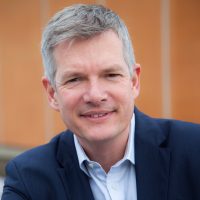Stand Up and Fight is the Message Philipp Rösler Sent from Frankfurt

Tim Stuchtey
Brandenburg Institute for Society and Security; German University of Digital Science
Dr. Tim H. Stuchtey is a Geoeconomics Non-Resident Senior Fellow at AGI. He is the executive director of the Brandenburgisches Institut für Gesellschaft und Sicherheit (BIGS), a homeland security think-tank based in Potsdam, Germany. He is also Professor for Economics of Cybersecurity at the German University of Digital Science in Potsdam. He has served as Director of AGI's Business & Economics Program. He works on various issues concerning economic policy, the economy of security, the classic German ‘Ordnungspolitik,’ and the economics of higher education.
Dr. Stuchtey studied economics with a major in international trade and international management and graduated in 1995 from the Westfälische Wilhelms-Universität in Münster. In 2001 he earned a Ph.D. from the Technische Universität Berlin in economics, which he obtained for his work in public finance and higher education policy. He worked as an economist for the German Employers Association and as a university administrator both at Technische and Humboldt-Universität Berlin. He was also the managing director for the Humboldt Institution on Transatlantic Issues, a Berlin-based think tank affiliated with Humboldt-Universität.
He has published a number of articles, working papers, and books on the security industry, homeland and cybersecurity issues, higher education governance and finance and on other questions of the so-called ‘Ordnungspolitik.’
Last weekend the Free Democratic Party (FDP) gathered in Frankfurt for an extraordinary party convention. This was originally scheduled to be solely about education and the question of whether the federal government and the states should be allowed to cooperate in school and higher education matters. Currently, the constitution allocates education policy fully to the Länder, which increasingly dissatisfies parents, since the state education system within the nation becomes very heterogeneous.
With the recent developments surrounding the Euro rescue and low approval ratings of the FDP in the polls, the new party leadership around Philipp Rösler decided to add an extra day to the convention. This gave party delegates a valve to blow off some steam and to discuss the poll among FDP members of whether to back a permanent European Stability Mechanism (ESM). The outcome of this poll will undoubtedly decide the fate of the Merkel/Rösler coalition in Berlin. While Merkel and the FDP party leadership seem to be willing to do almost anything to keep the euro area in its current format, a group around the otherwise unknown FDP member of the Bundestag, Frank Schäffler, initiated this poll among FDP party members. The FDP is the only party in Germany that has in its statutes such an option, where the members can force their will on their leadership.
The debate in Frankfurt clearly showed one thing: European politics, institutional reforms, and the functioning of the various rescue packages for the Euro are a hard thing to sell to rationally thinking individuals. Without question, the vast majority of all speakers were clearly in favor of the ESM. But the reasons they were able to give were more tactical, historical and full of euro-pathos than they were economic. This was best represented by an article published in the daily Frankfurter Allgemeine Zeitung by Guido Westerwelle and all former FDP foreign ministers (Scheel, Genscher, Kinkel) on the same day of the debate, in which they underlined Germany’s duty to do anything possible to keep the European integration process running. The functioning of financial instruments, the reasons for inner-European current account imbalances, and why they matter in a currency union are not issues one can move a crowd with. And of course, most importantly among the delegates at the convention, only a few of them showed any yearning for a return to the opposition days when they could say anything but move very little.
On the opposite side, Frank Schäffler reminded me a bit of a younger version of Ron Paul. A sharp libertarian logic with little sense for the politically feasible in an EU of 27, or a euro area of 17 nations. The arguments by themselves are often hard to contradict, but taken together, they are not convincing enough to allow gambling with the economic and political fate of the EU.
Nevertheless, the delegates of the party convention present in Frankfurt might have been a bit biased anyway. Most delegates are a member of the Bundestag, or a state or community parliament, and thereby have a lot to lose when the FDP decides to stop supporting Merkel and her crisis management. Add to this the general dissatisfaction of ordinary FDP members with the lack of results out of what was supposed to be a dream coalition and you could come up with an early Christmas surprise for Rösler and Merkel.
Philipp Rösler, the new star in the FDP, tried to wash away these doubts when in his opening and closing speech he told his supporters that in politics, it is OK to get knocked down. But if one stays down, one will end up counted out. Only when his party gets back to his feet will it have the chance to score a few more points. If he survives the poll on December 13, it seems he has a good chance to lead his party back in the ring.








